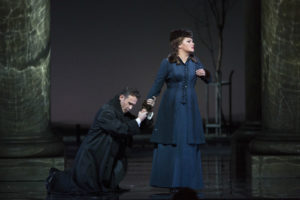
Opera Profile: Tchaikovsky’s ‘Eugene Onegin’
By David SalazarTchaikovsky wrote several operas throughout his career, but none have stood the test of time quite like “Eugene Onegin.”
The opera, which opened on March 29, 1879, is renowned for its sweeping melodic pulse and the tremendous emotional punch that Tchaikovsky punches throughout. The work is based on Pushkin’s famed novel and verse.
Short Plot Summary
Onegin and his friend Lensky visit the Larin estate where they run into Tatiana and her sister Olga. Lensky is in love with Olga while Tatiana falls instantly for Onegin, who is uninterested in people in general; he has a negative perspective on society at large.
Tatiana writes a letter to Onegin declaring her love, but he rejects her.
At Tatiana’s birthday, Onegin decides to flirt with Olga to upset Lensky, pushing the latter to confront him to a duel. Onegin accepts and when they meet for the duel, Onegin kills Lensky.
Years later, Onegin finds himself restless and without purpose in St. Petersburg. He runs into the Count Gremin who presents Tatiana as his wife. Onegin falls for her and tries to convince her to run away with him. But she won’t, despite still loving Onegin. The title character ends the work alone.
Famous Musical Numbers
The opera has three musical passages that remain touchstones of operatic lore. The first of these is the Polonaise that launches the final act. Lensky’s aria “Kuda kuda” is also well-known for its melodic intimacy.
But the finest and most famous musical moment is Tatiana’s Letter scene, an extensive look at the young girl maturing into a woman as she pens a letter to her dream man. Here Tchaikovsky showcases his genius as a dramatic writer.
Other Articles on “Eugene Onegin” on OperaWire
Opera Meets Film: How “Eugene Onegin” Creates Character Empathy in “The Talented Mr. Ripley”
Watch and Listen
Dmitri Hvorostovsky was one of the major interpreters of the role and here he is in a recording with Olga Guryakova, Pavol Preslik, and Ferruccio Furlanetto.
Categories
Opera Wiki

